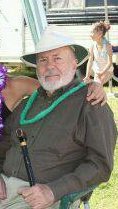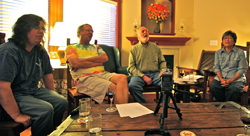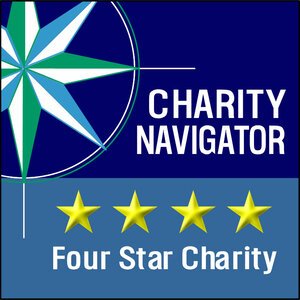By Hal Cannon, Western Folklife Center Founding Director
Barre Toelken is one of my great heroes. It’s more than the fact that he’s an esteemed folklorist who younger folklorists look up to. It’s more than his wonderful books on folklore, or the hundreds of songs he knows. It’s really the way he conducts his life with courage and individuality that makes him a hero.
We had been friendly and sung together, mostly at the yearly Fife Folklore Conference at Utah State University. When I began working in radio I asked to interview him. We ended up having a good conversation and over the years I’ve gone back to him several times for interviews on a variety of subjects.
A few years ago he asked me if I wanted to travel to Navajo country to visit his family. I began to see another side of Barre as I watched the way he worked with the Yellowman’s, helping them plow through the bureaucracy to make claims for the deaths of their men from cancer after working in uranium mines in southeastern Utah in the 50s.
As he conversed in Navajo I realized he was not just a folklorist, curious about exotic traditions that were far from what he grew up with. With time, he had become a trusted keeper of the family history, a respected elder. As a non-Indian who married into a large extended Navajo family it was not an easy position to be in. However, from my vantage he has always acted in the best interests of his kin. For instance he made a courageous choice to return recordings of their stories when he could not be assured the tape would not be used in ways that went against Navajo spiritual codes. With this decision he took heat from archivists and other scholars.
By the end of that trip to the Navajo Nation, Barre and I became true friends. In subsequent visits I have learned a lot about this man that goes way beyond teacher and scholar. Besides speaking Navajo, Barre is a scholar of German folklore. During the Cold War, I learned Barre was part of a group who helped dissident scholars escape eastern block countries. This was not all letter writing and meetings, it included midnight boat rides and escapades as thrilling as any spy novel.
When Barre suffered a massive stroke in 2002 he was hospitalized two blocks away from my home in Salt Lake City. His home is 90 miles away in Logan, and I was close by. Over those weeks I had the opportunity to spend a good deal of time with Barre as he began to discover what had gone wrong in the stroke, and started the long and arduous road back to a useful life. It was apparent from the beginning that he’d lost the use of his right arm. I remember, when he began feeling better I brought a guitar to his room, and while he made the chords with his left hand I strummed with my right. He remembered all the chords and we got a good laugh out of our coordinated effort. Shortly after that day, a group of his Logan friends came to visit and cajoled him into singing. It was a tough moment since so many words were tangled up in his brain; however, it proved to be good exercise as he began to find new routes in his brain for lost words.
I had no idea at the time that a group was forming that would stick with Barre to help bring back his songs. Some of the faces have changed over the years but those sessions of singing old folk songs and sea shanties still goes on in Barre and Miko’s living room. For everyone involved it has been an incredibly rewarding ten years of a grounding in music, each week, rain or shine.
LISTEN to Barre's singing group.
[audio http://westernfolklifecenter.files.wordpress.com/2012/01/btoalken-song.mp3]
This past summer I visited Barre to interview him specifically about the experience of his stroke. I returned and recorded a session of music with the group a few weeks later. The short "What's in a Song" feature Taki Telonidis and I produced for NPR represents a small amount of the material collected. I hope to continue to interview Barre, and even though he is getting older and his rehabilitation is slowing, his mind and heart are still strong as ever. I value Barre Toelken’s friendship.
LISTEN to Barre's story on What's in a Song
[audio http://westernfolklifecenter.files.wordpress.com/2012/01/btoelken_wintro.mp3]





